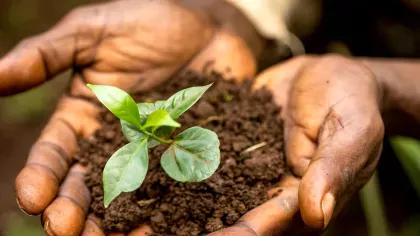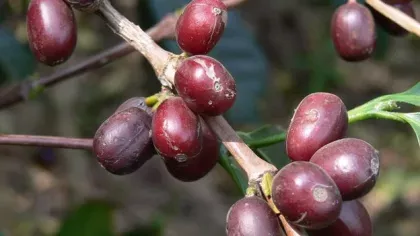Building a climate resilient coffee economy for Ethiopia
Providing a climate-resilient strategy for coffee production in Ethiopia.

Coffee is the backbone of the Ethiopian economy. Ethiopia is Africa’s largest coffee producer and the world’s fifth largest exporter of Arabica coffee. In 2014/2015 Ethiopia exported around 180,000 metric tonnes of coffee at a value estimated to be in excess of 800 million USD. Coffee farming provides a livelihood income for around 15 million Ethiopians (16% of the population), based on four million smallholder farms. For many of these farmers, coffee is their single most important source of income. Ethiopia’s Poverty Reduction Strategy Paper and Growth and Transformation Plan (2010/11–2014/15) highlights that increasing coffee productivity, while conserving biodiversity and genetic resources, will play an important role in Ethiopia reaching the first Millennium development goal (eradicate extreme poverty and hunger). Despite this considerable potential, coffee production in Ethiopia faces numerous challenges in an uncertain climatic future.
In 2013, RBG Kew and Ethiopian partner Environment and Coffee Forest Forum (ECFF) embarked on the project Building a climate resilient coffee economy for Ethiopia. The project was part of the Strategic Climate Institutions Programme (SCIP), designed to build Ethiopia’s capacity to cope with climate change across the public, private and civil society sectors and to respond to the challenges of transitioning to a climate resilient green economy (CRGE). The aim of the project was to provide a climate resilient coffee economy strategy for Ethiopia via a rigorous assessment of the influence of climate change on coffee producing areas and wild coffee forests.
The climate change assessments were based on a combination of activities, including high resolution mapping (based on satellite data), climate change modelling, extensive ground-truthing, farmer interviews and climate monitoring. After more than 30,000 km of travel across Ethiopia we were able to collect and verify the data needed to map and assess coffee-growing and run the computer modelling necessary to understand what would happen to the country’s coffee growing areas over this century under accelerated climate change. We ran 23 general circulation models (GCMs) under a broad range of scenarios and permutations, and compared these analyses with information gathered from coffee farmers and producers and weather station data, to reconcile modelled future outcomes with observed or assumed climate change trends.
The results of the project are presented in a scientific research article, summary report and coffee atlas.
Objectives
- To assess the risks and opportunities for coffee production and wild coffee forests in Ethiopia in relation to climate change.
- To understand what would need to be done (and where and when) in order to build a climate resilient future for the Ethiopian coffee sector.
- Scientific research article: Resilience potential of the Ethiopian coffee sector under climate change.
- Summary report: Coffee Farming and Climate Change in Ethiopia: Impacts, Forecasts, Resilience and Opportunities. Summary Report 2017.
- Coffee atlas: Coffee Atlas of Ethiopia.
Main project partner (Ethiopia)
Project partners (Ethiopia)
- Ethiopian Biodiversity Institute (EBI)
- National Meteorology Agency (NMA)
- Ministry of Environment and Forest (MEF)
- Ministry of Agriculture (MoA)
- Addis Ababa University (AAU)
- Oromia Coffee Farmers’ Cooperative Union (OCFCU)
SCIP Fund
Davis, A.P., Gole, T.W., Baena, S. & Moat, J. (2012)
The impact of climate change on indigenous Arabica coffee: predicting future trends and identifying priorities
PLoS ONE 7: e47981
Moat, J., Williams, J., Baena, S., Wilkinson, T., Gole, T.W., Challa, Z.K., Demissew, S., & Davis, A.P. (2017)
Resilience potential of the Ethiopian coffee sector under climate change
Nature Plants 3: 17081 (2017). DOI: 10.1038/nplants.2017.81. Available online
Moat, J., Williams, J., Baena, S., Wilkinson, Demissew, S., Challa, Z.K., T., Gole, T.W. & Davis, A.P. (2017)
Coffee Farming and Climate Change in Ethiopia: Impacts, Forecasts, Resilience and Opportunities Summary Report 2017
The Strategic Climate Institutions Programme (SCIP). Royal Botanic Gardens, Kew (UK). Pp. 37
Davis, A.P., Wilkinson, T., Challa, Z.K., Williams, J., Baena, S., Gole, T.W. & Moat, J. (2017)
Coffee Atlas of Ethiopia
Royal Botanic Gardens, Kew (UK)
Justin Moat, Jenny Williams, Susana Baena, Timothy Wilkinson, Tadesse W. Gole, Zeleke K. Challa, Sebsebe Demissew & Aaron P. Davis
Resilience potential of the Ethiopian coffee sector under climate change
Nature Plants
Articles
Coffee under threat - BBC News (19 June 2017)

